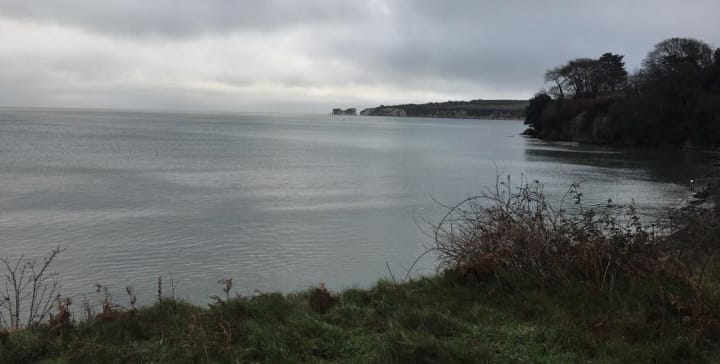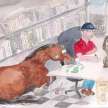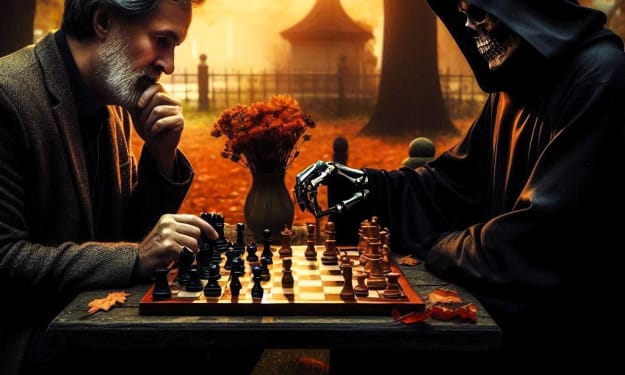Studland in Dorset
It's where I went on holidays as a kid

Thursday 5th January 2023
I drove from Swanage where I was staying to Studland. Sort of a meander down memory lane with the music from "Love Actually" playing on the sound system.
Ulwell is just outside Swanage and is the last concentration of homes before the Purbeck become an area of outstanding natural beauty with steep sided hills rising on either side of the road. It is near the sign welcoming visitors to Swanage that there used to be a toll gate where Jinny Gould lived and collected tolls. Local legend claims she was a witch and after dark would transform herself into a cat and tease any travellers who came along. Her nocturnal sports were stopped one night when a drunken cart driver caught Jinny the cat with his whip, gave her a crack across the back of the head making the cat disappear. The next day someone went to check on Jinny and there she was, lying dead in her bed.
Even though today was dull where I parked up for a few minutes had an extra chill in the air. Dark trees hung over the road and it was difficult to imagine if it ever felt warm where I stood. The toll gate and Jinny’s house were demolished years if not centuries ago and there is no record of their exact location. I think I have a good idea where it might have been.
Before turning reaching Studland Village there is a farm on the right-hand side called "Westfields". It is set away from the road and in the lowest part of a very shallow valley looking down towards the English Channel and the Isle of Wight.
This is where my parents brought us for our first summer holidays here in England. It was where my grandparents had brought my mother and her sisters for holidays during World War II.
It was while they were staying there that the Batlle of Britain raged in the skies of southern England. It was while they were there that a Heinkel bomber was damaged in a dog fight and itcrash landed in the fields in view of the farmhouse.
My Grandfather, who could speak German, which is another story, rushed out to try and help the stricken crew. He had received first aid training in World War I and so felt able to help if he could. As he ran towards the aircraft farmhands came along as well waving pitchforks threatening the crew. All but one had got out of the aircraft and as soon as the farmhands saw that the men were stressed and frightened, they put their tools down and comforted them.
It isn’t people who make wars is it?
One crew member was trapped in the cockpit and was badly injured. My Grandfather realised he did nt have long to live and could not be moved. He talked to him in his own language and spoke the last words he would ever hear while he was still alive.
When we stayed at the farm it was still run by the same lady who had run it when my mother stayed there. The buildings were old army huts from World War I. They were so old that they looked like they were rotting into the ground. The floor in the part we stayed had a slope to it and no matter how we arranged ourselves in bed at night we either ended up on the floor or woke up barely hanging on to the mattress.
The lady, in appearance, was witch like. She was small, shrivelled and was missing three or four fingers from one of her hands. As I was only nine or ten at the time, I felt uncomfortable meeting her as I had never seen anyone so disfigured in my life until then.
The farm buildings have been renovated or replaced. They look level so no more falling out of bed.
I parked the car at The Middle Beach Car Park and started to walk through the dunes to the beach. I couldn’t walk on the dunes as they were roped off. Signs attached to the ropes swung in the breeze. They said that “These dunes are resting”. They must have had a very busy Christmas.
Even before I got to the sands the place was beginning to feel and look smaller than I had remembered it. On the way down I met a man who looked like a serious bird watcher. Dunn coloured all weather clothes and a pair of very powerful binoculars I asked him if he had seen anything interesting yet.
"Only a couple of crested grebes and a cormorant. Should have got here earlier before the dog walkers. Never see anything much when they get here."
He asked what I was doing. I told him I was going to walk along somewhere I hadn't been for nearly sixty years. He told me to expect to be disappointed and walked back towards the car park. I didn't have time to thank him for his comment or ask where I could get some anti- depressants.
What I saw and walked along was not the same beach as it was all those years ago. It had shrunk. Maybe global warming and resultant rises in sea levels had done this. Maybe it was a reality check that dashes childhood memories on the rocky shores of adulthood. When I walked along this beach during those holidays it felt massive. So big that I used to imagine I was trekking endlessly in the Sahara under a blazing sun. My parents even bought me a sun hat like the French Foreign Legion wore which aided and abetted my dream world.
Today was the middle of winter, overcast and calm. It couldn't have been more different from those so called "halcyon" childhood holidays and “yes” it all looked smaller.

About the Creator
Alan Russell
When you read my words they may not be perfect but I hope they:
1. Engage you
2. Entertain you
3. At least make you smile (Omar's Diaries) or
4. Think about this crazy world we live in and
5. Never accept anything at face value






Comments
There are no comments for this story
Be the first to respond and start the conversation.